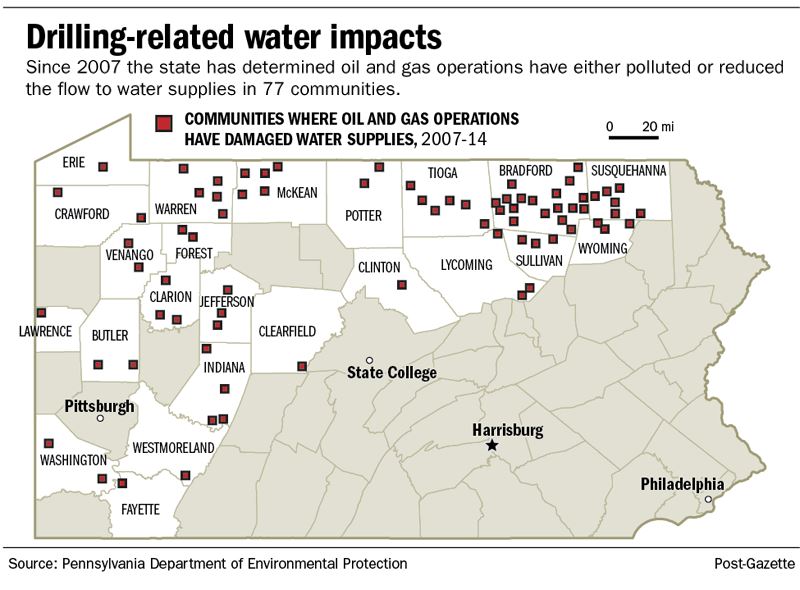There's mixed data coming from both sides. Proponents of fracking claim there's been no major contamination with over 10,000 sites drilled. However, countering their claims are stories like this, and there's many of them, documenting at least low-level spills around sites.
We like domestic energy--the positive impact on our economy and jobs. We see natural gas as a great bridge between dirtier fossil-fuel sources and a clean-energy driven economy. We dislike fracking heavy use of unknown chemicals (that is soon to change, as you will learn listening in to some of our shows), and their pouring of millions of gallons of water, some of which is quite sparse, particularly out West, deep into the ground.
If you have information or expertise to add, feel free to send us material.

"Oil and gas operations have damaged Pennsylvania water supplies 209 times since the end of 2007, according to official determinations compiled by the Department of Environmental Protection that the agency is preparing to release for the first time.
State environmental regulators are planning to post the information on DEP’s website this month, but an early version of the spreadsheet was provided to the Pittsburgh Post-Gazette in response to an open records request.
The spreadsheet lists the 209 affected water supplies by county, municipality and the date regulators concluded that activities related to oil or gas extraction were to blame for contaminating or diminishing the flow to a water source.
The document does not disclose property owners’ names or addresses and it does not detail which companies that were deemed responsible for the damage, what caused the disruptions or what pollutants were found in the water.
DEP’s deputy secretary for oil and gas management, Scott Perry, said the agency intends to enhance the spreadsheet by adding links to the letters or orders related to each case at some point, which should reveal more information about how water was affected.
Environmental regulators are required by law to determine within 45 days of getting a drilling-related water complaint if oil and gas operations contaminated a water supply or reduced its flow. DEP reports its findings in letters to property owners. It also issues orders to companies to fix the damage in cases where oil and gas operations are found to be accountable or are presumed to be the cause because of the proximity between drilling activities and a disrupted groundwater source.
Those conclusions are public records.
After initially fighting news organizations’ requests for the determination letters and arguing it would be too difficult to find all of them in its files, DEP has increasingly provided access to the documents in the last year after courts required their release and as public interest in the information has grown.
When DEP posts the tally of damaged water supplies this month, it will mark the first time the agency has released its official accounting of drilling-related pollution and diminution cases on its website.
“This frequently requested information is being shared with the public in our continued effort to be as open and transparent as possible,” DEP spokeswoman Morgan Wagner wrote in an email. She said the department plans to update the list as more determinations are made.
The number of impacts is small relative to the number of new oil and gas wells drilled during the same time period – nearly 20,000, according to DEP records.
Patrick Creighton, a spokesman for the industry trade group the Marcellus Shale Coalition, said in a statement that “this data further demonstrates that the overwhelming majority of oil and natural gas wells in Pennsylvania – over 99 percent – have been developed without any impact on ground or well water.”
But people who have seen their water disrupted often describe the experience as uniquely unsettling..."
You will find the rest here: http://powersource.post-gazette.com/powersource/policy-powersource/2014/07/22/DEP-Oil-and-gas-endeavors-have-damaged-water-supply-209-times-since-07/stories/201407220069

No comments:
Post a Comment